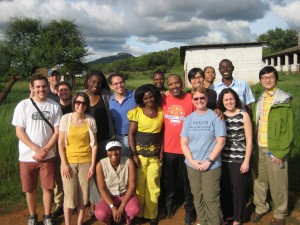On Being Saved in Africa
And day by day the Lord added to their number those who were being saved.” – Acts 2:47b
Last week, I was waiting for a nurse’s aide to be finished in the room of a homebound person to whom I was bringing communion, and I found myself without any book to read except my bible. Knowing that I would be taking a course featuring the Acts of the Apostles this spring, I decided to open to the beginning of Acts and read. I got only to the end of chapter two, verse 47, and I had to stop and think. The second half of that verse read, “And day by day the Lord added to their number those who were being saved.” The phrase struck me. Being saved? Weren’t these folks saved before they decided to join the Christian community? Didn’t the process go something like this? 1) They heard the Jesus story 2) they believed it 3) they were forgiven for their sins 4) and therefore saved and 5) they became part of the body of Christ.
Immediately, I distrusted the translation. This concept of being saved as a once and done conversion thing loomed so heavily in my imagination as the only orthodox way to think about salvation, that I thought the bible must consistently talk about salvation in that way: once and done. So, like a good theology student and librarian, I consulted some reference sources, some articles, and a friend who knew Greek and found out that the word used in Acts is most definitely a present tense word. In this scripture, the people who God was adding to the community were not the people who had been saved, but the people who were “being saved.”
The idea of “being saved” certainly resonates with my personal experience of faith in Christ. Yes, I can point to the one moment in my personal history when I finally let the walls around my heart open just enough for the Spirit to work herself in a crack and bring the whole structure tumbling down. But I also know, and I think my Wesleyan tradition that allows for the possibility of backsliding and of moving on to perfection knows, that being saved isn’t just once and done. Even with God welcomed into my heart, I am prone to wandering, prone to distraction, and above all, prone to fear. So I am constantly in need of saving.
God saved me from fear numerous times during my trip to Zimbabwe. First, it was my fear of being in an airplane for 12 hours straight, then my fear of dying in a bus crash, then my fear of bugs, then my fear of offending my gracious hosts, then my fear of speaking up about sexism and heterosexism, and then my fear of losing relationships with my beloved classmates because of my speaking up. God saved me from all of those fears. God saved me because I survived all of those things with my faith not only intact, but expanded. God saved me through the grace extended to me by my brothers and sisters in Christ who chose to remain in relationship with me despite our cultural and theological and social differences. God saved me by allowing my heart to be open to the people in my class from all over Africa: from Zimbabwe, from the Democratic Republic of the Congo, from Angola, from Kenya, from Nigeria, from Sierra Leone, from Liberia.
But when I think about being saved in Africa, I don’t think just of what I was saved from, but I also wonder, what was I saved for? So, now that I no longer fear insanely long air travel or my untimely death on a bus, or bugs (okay, I’m still working on the bugs), what does that free me to do? And now that I no longer fear saying or doing the wrong thing, or speaking up about my beliefs, or losing relationships because of being authentic, what does that free me to do? And now that I love not just “people from” particular African countries, but real, living, breathing, three-dimensional humans like Freddy and Eva and Domingos and Eunice and Peter and Yvonne, what am I being saved for? Now that I love them and have encountered Christ in them, what am I being freed to do?
Certainly, I have been freed from seeing Africa as some monolithic continent, some flat outline colored in all orange on a map. Certainly, I have been freed from seeing Africa as someplace impeding my political goals for the United Methodist Church. Certainly, my love for all of these people is saving me for the work of building connection and community even across differences that sometimes seem insurmountable. To paraphrase Julian of Norwich: what seems impossible to us, is not impossible to God.
I don’t know yet what my experience of being saved (over and over) in Africa will mean for my future and my call to live as a disciple of Christ. But since I am being saved, even now, even as I reflect and discern, I trust that God is with me and with all of us, empowering us and helping us to understand what God is saving us from and what God is saving us for.
Amen.


I’m going to spend time on this beautiful snowy day reflecting on my own fears and what I have learned about from them. Thanks for sharing.